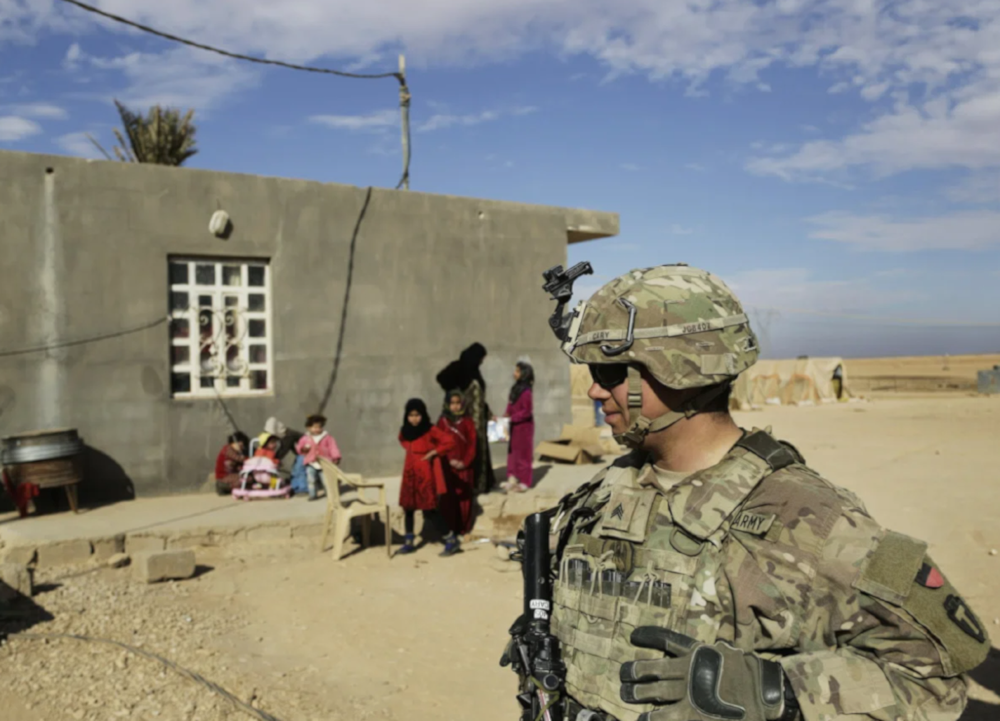Declassified files reveal UK frustration with Chirac over Iraq
The documents include minutes from a key cabinet meeting held on March 17, 2003, following Chirac’s announcement that France would veto any resolution authorizing military intervention.
-

US Army soldier stands outside an Iraqi family home in al-Anbar in western Iraq on January 27, 2018. (AP)
Newly declassified UK government documents, released on Tuesday, reveal the frustrations of then-Prime Minister Tony Blair and his cabinet with French President Jacques Chirac's opposition to "UN-backed military action in Iraq in 2003."
The documents, released by the National Archives, include minutes from an emergency cabinet meeting on March 17, 2003, just a week after Chirac announced he would veto any resolution authorizing military action.
UK ministers at the meeting agreed that "the French attitude had undermined the mechanism of the UN to enforce the will of the international community."
Blair expressed frustration, saying, "We had tried our utmost," but the French "were not prepared to accept that if President Saddam Hussein of Iraq did not comply with UN obligations, military action should follow."
Dive deeper
Despite significant opposition within the UK, Britain joined the 2003 US-led invasion to oust Saddam Hussein, citing allegations that the Iraqi President had stockpiled weapons of mass destruction (WMD). These accusations, heavily promoted by the administration of US President George W. Bush, were later proven to be false.
According to the documents, then-Foreign Secretary Jack Straw accused Chirac of "torpedoing the whole process" and suggested that the French leader was attempting to "open up a strategic divide between France and the UK."
Three days later, Straw noted that Chirac "appeared to be positioning himself... (to) become leader of one side of the bi-polar world he advocated," in opposition to a US-dominated world order.
The UK joined the US-led invasion on March 20, 2003, despite large-scale protests, including one in London with over a million demonstrators against military intervention.
The invasion and the ensuing war severely damaged Blair's political standing, leading to the Chilcot inquiry in 2016, which concluded that Blair had deliberately exaggerated the threat posed by Saddam Hussein's regime.
Blair later expressed "sorrow, regret and apology" for mistakes made in the planning of the conflict. Alastair Campbell, Blair's influential press chief at the time, stated that the decision would "weigh heavily on him... for the rest of his days."
Campbell was also embroiled in controversy after the BBC reported that he had "sexed up" a dossier on Iraq’s military capabilities, a claim he denied.
Read more: UK killed many civilians in Iraq, despite claims otherwise: Guardian
It is worth noting that the war resulted in 3.9 million Iraqi refugees that were displaced between 2003 and 2016; 2 million of them fled the country, while 1.9 million were left displaced within Iraq.
The medical journal The Lancet estimated civilian deaths at 600,000. As for Iraqi national military forces and national and local police forces, 48,719 were killed in the period between March 2003 and August 2021.
The numbers, however, do not account for the ones who were killed due to the destruction of healthcare systems, which caused as many deaths from malnutrition and diseases.

 3 Min Read
3 Min Read








